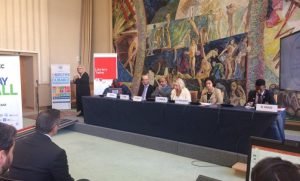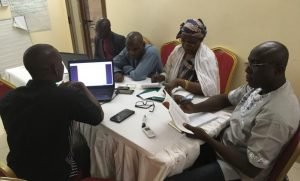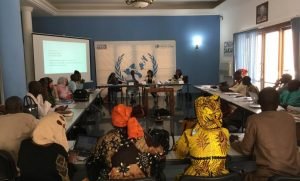The African Disability Forum (ADF), an umbrella organization of federations of persons with disabilities in Africa, along with Humanity & Inclusion (HI) and Norwegian Agency for Development Cooperation (NORAD) conducted a four-day regional workshop on the ratification of the African Union Disability Protocol (ADP) in Nairobi, Kenya from August 30 until September 2. The workshop, a part of the HELASIA Project: Health, Education and Livelihoods in Africa; a Sustainable Inclusion Approach, had participants from nine African countries – Mozambique, Ethiopia, Gambia, Kenya, Niger, Rwanda, South Africa, Botswana, and Benin.
The opening session on Day One had Anderson Gitonga from the United Disabled Persons of Kenya (UDPK) welcoming the participants. He said, “We welcome all of you here to our country and are very excited to have you. Kenya ratified the Convention in 2018 and we are also on the top in terms of the ratification. My expectation out of this workshop is on how we can have more dialogues and share our experiences with each other, including good practices, and address any challenges to learn from each other.”
 Jane Marie Ong’olo, Head of Division, Social Welfare, Vulnerable Groups, Drug Control and Crime Prevention, Department of Health, Humanitarian Affairs and Social Development from the African Union Commission (AUC), said, “I would like to thank ADF for organising such a timely workshop. As you must be aware the AU 4th session of the specialised technical committee of labour and social development is scheduled to take place in November/December 2021, where member states will review and take stock of progress made with various commitments, projects, policies, and treaties adopted in previous meetings, including the disability strategic plan of action and the Protocol.”
Jane Marie Ong’olo, Head of Division, Social Welfare, Vulnerable Groups, Drug Control and Crime Prevention, Department of Health, Humanitarian Affairs and Social Development from the African Union Commission (AUC), said, “I would like to thank ADF for organising such a timely workshop. As you must be aware the AU 4th session of the specialised technical committee of labour and social development is scheduled to take place in November/December 2021, where member states will review and take stock of progress made with various commitments, projects, policies, and treaties adopted in previous meetings, including the disability strategic plan of action and the Protocol.”
Dr Jane further stated, “On its part, the AUC is committed to promoting an inclusive and accessible continent for all. The Union has developed several strategies geared towards inclusive sustainable development and the enjoyment of basic human rights by all as encapsulated in its blueprint developmental Agenda 2063 – leaving no one behind principle; further bolstered by the adoption of an all-inclusive Social Agenda 2063, and a supporting Social Protection Protocol”.
“As I conclude, we are we looking forward to mutually beneficial cooperation in the following areas: · Implementation of the AU Disability Strategic Framework; including promoting the ratification of the Protocol on Disabilities. · Implementation of the Plan of Action on Ending Attacks and Other Human Rights Violations on Persons with Albinism; as well as support to the office of the Special Envoy. · Supporting the Committee of Experts on the Rights and Welfare of the Child to focus on children with disabilities and children with albinism. · Adequately resourcing disability agenda, and in particular persons with albinism. I would like to appeal to you to partner with the African Union to step up our advocacy to ratification but importantly, implementation of this instrument. In the same vein, your support in the implementation of the AU Disability Strategic Framework and the Plan of Action on Albinism will ensure that we have an inclusive and accessible Africa in our lifetime,” Dr Jane further added.

Shuaib Chalklen, ADF’s Executive Director, said, “ADF is a continental structure with 43 members. The purpose of this regional advocacy workshop is to simplify things. We are human rights activists focusing on the rights of persons with disabilities. We want to do a regional strategy that we can share with all our members to focus on the ratification of the AU protocol on disability. Most countries have ratified the UN Convention. We must build our own institutions – as a civil society organization. The African Union is the organ of the civil societies. We want to advocate at the country level and push for the ratification for the AU protocol. It is a tool that we need to use – to develop our own training on the AU Protocol. This is what we want to do in the next four days – develop a strategy and develop joint networks and have an advocate lobby as a united African disability movement.”
Idriss Maiga, ADF’s Chairperson, said, “It is an honor for me to speak on behalf of the ADF which is an umbrella organisation for persons with disabilities in Africa. ADF is focused on promoting the rights and inclusion of persons with disabilities and their families in Africa through empowerment and participation, unifying and amplifying their voices, and strengthening their organizations and partnerships.
ADF’s membership includes national DPO federations in 43 countries, 4 sub-regional DPO federations and 9 continental DPOs. I am happy to find that the African Union has developed the African Disability Protocol (ADP), a useful tool for advancing the rights of persons with disability considering African realities. But I am also disappointed that this instrument is ratified by only one country in Africa (Mali). He said that to reverse this situation, it is important to consider the point of view of people with disabilities and their experience to action and encourage governments to ratify the ADP.”
Cantol Pondja, Chairperson of the Forum of Organisations of Persons with Disabilities of Mozambique (FAMOD), said, “We are here to learn from different experiences and to learn more about how to address the challenges and make the disability movement stronger. Mozambique must ratify the protocol to guarantee respect and fulfillment of the rights of people with disabilities, particularly the most marginalized groups. It will give us new and better opportunities to use our African values and institutions as a leverage for the well-being of persons with disabilities.”
The main objective of this four-day workshop was to improve awareness of OPDs on the contents of the Disability Protocol as well as on the AU Human Rights system. Dominique Bizimana, Chairman of the National Union Disabilities Organizations in Rwanda, said, “I want the African Disability Protocol to be ratified to accelerate alongside the implementation of UNCRPD. In Rwanda, we started the implementations of concluding observations. The ratification is important for my country as it will put a pressure on the Government of Rwanda to implement the Protocol as well as the UNCRPD.”
Domingo Nassirou, President of Fédération des Associations des Personnes Handicapées du Bénin (FAPHB), said, “We want the protocol to be ratified by our country Benin to be among the African nations that protect and promote the rights of people with disabilities. The importance of the ratification of the African Protocol on the Rights of Persons with Disabilities is to constitute a legal arsenal provided, after the ratification of the Convention on the Rights of Persons with Disabilities, and the promulgation of the law on the protection and promotion of persons with disabilities in the Republic of Benin, to ensure that all persons with disabilities enjoy all their human rights. In particular, the right to life, the right to education, the right to health, the right to employment, the right to accessibility to public and private buildings, the right to sports, and the right to culture.”
The first day of the workshop witnessed the participants being divided into  groups for breakaway sessions focusing on the areas of convergence and divergence. The participants were divided into four main groups and were asked to do a comparison between the UNCRPD and ADP – what are the main differences; what are the main similarities; are there any current challenges with interpretation and/or implementation of these in their respective countries, and if they have any further questions for clarity. The ten signatories to the ADP are Central African Republic, Burkina Faso, South Africa, Tanzania, Mali, Gabon, Rwanda, Cameroon, Angola, and Mozambique. The purpose of the AU Disability Protocol is to promote, protect and ensure the full and equal enjoyment of all human and people’s rights by all persons with disabilities, and to ensure respect for their inherent dignity.
groups for breakaway sessions focusing on the areas of convergence and divergence. The participants were divided into four main groups and were asked to do a comparison between the UNCRPD and ADP – what are the main differences; what are the main similarities; are there any current challenges with interpretation and/or implementation of these in their respective countries, and if they have any further questions for clarity. The ten signatories to the ADP are Central African Republic, Burkina Faso, South Africa, Tanzania, Mali, Gabon, Rwanda, Cameroon, Angola, and Mozambique. The purpose of the AU Disability Protocol is to promote, protect and ensure the full and equal enjoyment of all human and people’s rights by all persons with disabilities, and to ensure respect for their inherent dignity.
Abayneh Gujo of Federation of Ethiopia Associations of Persons with Disabilities (FEAPD) said, “As a federation of organizations of persons with disabilities, we need to ratify the protocol to promote, protect and ensure the full and equal participation and benefits of all persons with disabilities, and to ensure respect for their inherent dignity in African context and system. It is very important because ADP has African flavours which UNCRPD doesn’t take into consideration such as establishment of association of families as part of the OPD, ritual killings of PWDs, etc.”
Muhammed Krubally, Chairman of The Gambia Federation of the Disabled (GFD), said that “Firstly, the ratification of African Disability Protocol will have the potential for undoubtedly according respect, promoting and protecting the Fundamental Rights of Persons with Disabilities as enshrined in its preamble. Secondly, the ADP will boost participation and inclusion of persons with disabilities in all spheres of lives and sectors. Thirdly, discrimination against persons with disabilities may not be eliminated but will drastically reduce from the minds and hearts of the people. Fourthly, Africa as a Continent will have a common and unified legal instrument or protocol that can be used as an instrument of legislation and litigation in all African courts in the event of any infringement of the fundamental rights and freedoms of persons with disabilities. And lastly, when the said Protocol is ratified thereof, it has the appropriate legal standing and influence to be cross-referenced in accordance with the local and national legislations that complement each other in the event of any disputation of any right addressed by any particular provision or text by the Local Legislation and or the Protocol”.
 Day Two of the workshop commenced with a feedback session on the learnings of the previous day. The participants were very proactive in sharing their feedback with the workshop facilitators and said that the sessions are engaging, interesting, educative, informative, productive, and inclusive. Lidia Pretorius, the facilitator for the workshop, discussed the importance of campaign management and advocacy messaging with the participants. The participants were divided into five different groups to craft targeted campaigns and create compelling, relevant, and concise messages for the right audience and to accelerate the ADP ratification process.
Day Two of the workshop commenced with a feedback session on the learnings of the previous day. The participants were very proactive in sharing their feedback with the workshop facilitators and said that the sessions are engaging, interesting, educative, informative, productive, and inclusive. Lidia Pretorius, the facilitator for the workshop, discussed the importance of campaign management and advocacy messaging with the participants. The participants were divided into five different groups to craft targeted campaigns and create compelling, relevant, and concise messages for the right audience and to accelerate the ADP ratification process.
Day Three of the workshop gave the participants an opportunity to engage in a power mapping exercise and the country federations were asked to make presentations in the second half of Day Three and on Day Four. In her closing remarks, Dr Jane from the African Union Commission said, “I would like to thank Lidia Pretorius and ADF for this excellent facilitation and foundational meeting. This is one of its kind as we got to discuss the strategies for the ratification of this protocol. Strategically, this has importance as we are speaking with one voice.” She further added, “It is important and foundational that we work with OPDs. For me to have you all here is the best because you represent a huge constituency. Each person living with a disability in Africa is represented here. I liked the strategies that the countries have presented. We all have a common interest but do have country-specific challenges. Coming from AUC, I would like to make a commitment that – We are together. We are working together. Thank you for helping the Commission to actualize at the Commission level.”

Discussing about the importance of strategic campaigns, Dr Jane said, “ADF is such an important node to bring OPDs together. We would continue to work with you and to bring the networks together. The strategies that the countries have presented in this workshop are hugely important to see that we are committed to have the protocol implemented by the middle of next year is doable. We want continental consensus and to make sure that we have universal ratification. You know what you have gone into. Let’s look at the low hanging fruits and maximize them – at the entry level, and national, continental as well as regional levels. It is important that we become a part of the national steering committees. We are a movement. We are big. And we can be listened too. Use your power now to convene and hold your government accountable.”
Thanking the participants, the facilitation team, logistics team of International Disability Alliance, AUC, UNECA, UNICEF, HI and NORAD, the Executive Director of ADF Shuaib Chalklen said, “I am very happy that we finally organised this workshop. I am optimistic that we will try our best to push our governments to ratify. And we don’t see any reason why they can’t.”
Anderson Gitonga from UDPK, in his closing remarks, said, “We appreciate the content of this workshop – this is a game changer in terms of our push to have the protocol ratified in Kenya. We appreciate the support that we have received from ADF, IDA, AU and all the other experts. Trust and belief – thank you for giving it to us.”
(Written by: Anika Sharma, African Disability Forum)






